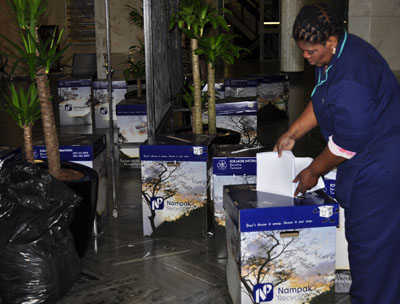 |
|
Big blue boxes for the recycling of waste paper were placed in the foyer of the Francois Retief Building and staff and students were invited to bring their waste paper. Seventeen boxes of white paper and eight boxes of newspapers and magazines were collected.
|
In order to be involved in the green initiatives on campus, the Faculty of Health Sciences has been supporting the university recycling project. Last week, waste paper for recycling was collected in the foyer of the Francois Retief Building.
At the request of staff members, the faculty will repeat this initiative every term. “We thus urge you to collect all your waste paper for recycling – this can be full pages, scrap paper, or shredded paper. However, please keep white paper (normal photocopy and printing paper) separate from newspapers, magazines, coloured paper and cardboard. And please, no food!
“If you can’t wait until next term, the caretakers can also collect paper from your department – their contact details are listed below. What an easy way to tidy up your office!” said Marlene Viljoen from the faculty.
Empty ink cartridges can also be recycled If you have any, you can send them to the caretakers’ office or you can keep them with you until next term’s collection day in the foyer.
Staff will be notified via e-mail of the next collection day. “Thank you for your enthusiastic response,” Marlene said.
Contact the caretakers on 405 5953/ 3015, short cell number 6998, at any time to collect waste paper or ink cartridges in your department.
- Ilde Kilbourn